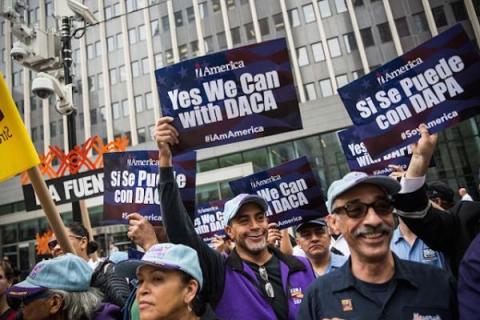The "dreamers" program instituted in 2012 by Barack Obama's administration could be on its way out.
Officially named the Deferred Action for Childhood Arrivals (DACA) program, the act allows certain undocumented immigrants who entered the country as children, to hold work permits, and defer their deportation.
Reports from the White House press corps suggest the program could end as soon as September 1, although the White House has disputed the accuracy of those reports.
Texas and nine other states are already challenging the program through the legal system and have threatened to take legal action unless the program is shut down by September 5.
No Final Decision Yet
At a news conference on August 31, White House Press Secretary Sarah Huckabee-Sanders was quick to point out that the commander-in-chief has not yet made an official decision on DACA.
Talk of dismantling the program has swirled since the campaign trail, but to date, few details have emerged as to what kind of changes would be coming.
The White House insists that any decision made on DACA is still under review and that the media will be informed as soon as the government comes to a formal decision.
Since the program was created by executive order, it doesn't receive the same protection that a bill voted on by Congress would have.
Consequences of Ending DACA
From the right, groups are typically opposed to lax immigration laws, so it makes sense that the end of DACA could shore up concerns from his conservative base. Although, early indications show some hesitancy from the right to endorse the dismissal of DACA.
From the left, concerns have been vocalized on twitter as liberal groups are suggesting dire consequences for the Trump administration should he end the program. For example, the Women’s March sent out a tweet on the 31st pledging to make President Trump’s life “impossible” if he ends DACA.
While it appears that Trump doesn’t intend to take action to deport the dreamers immediately, they would not be eligible for renewed work permits once their existing permits expire. Past comments from the president hint at a potential re-shaping of the program where some elements would be kept.
Polls suggest Americans are concerned about the impact of kicking out nearly a million potential citizens who have grown up on US soil. A poll from November 2016 supports keeping the program in place, showing that 58% of those surveyed were against ending the program.
A New Dream?
One avenue the White House might go, is an alternative program in the form of the new Dream Act, which Senators Lindsey Graham and Dick Durbin introduced in July.
Economic security was cited as a major motivator in the effort to keep DACA alive. One study estimated the economic impact of ending the program as a loss of $433.4 billion over ten years.
DACA gives immigrant children a chance to experience the life of a US citizen without battling the legal ramifications of citizenship, creating contributing citizens who could become community leaders. If Trump does choose to end it, he could be face significant political backlash.
